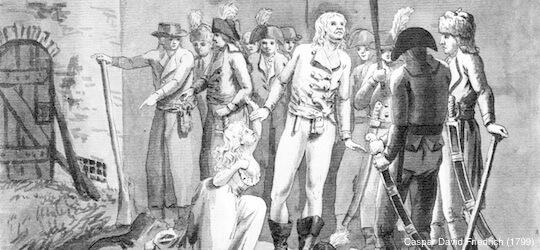Radical and Moderate Sturm und Drang: A Virtual Summer Workshop
August 2-3, 2021
Organized by Martin Wagner (University of Calgary) and Ellwood Wiggins (University of Washington)
Register for this online event:
Day 1: https://ucalgary.zoom.us/
Day 2: https://ucalgary.zoom.us/
Jonathan Israel’s provocative thesis that the European Enlightenment can be divided into two clearly distinguishable camps—one moderate and one radical—has received significant critical discussion, most recently with a specific focus on the tenability of this claim for the German tradition. Although Israel himself places most German thinkers in the moderate camp, his designations are contested and the situation in eighteenth-century German-speaking lands is quite complex (see Radical Enlightenment in Germany: A Cultural Perspective, ed. Carl Niekerk, Brill, 2018). Surprisingly, however, these discussions have not yet taken into account Germany’s most iconic literary movement of the eighteenth century, the Sturm und Drang. Attending to the Sturm und Drang in probing Israel’s dichotomy is important not only to close a gap in the historiography of the European Enlightenment, but also because it allows to situate and discuss some of the characteristic interior tensions of the Sturm und Drang within a framework relevant to the European Enlightenment more broadly. For the Sturm und Drang is characterized both by radical gestures of formal transgression against neoclassical tendencies in German art and, with some important exceptions, a surprising degree of political moderation, or even reaction (embodied, for instance, in the aristocratic privilege of Goethe’s Götz and the mild reform projects of Lenz’s “Der Landprediger”).
From nineteenth-century scholarship through GDR Germanistik, this tension between formal radicality and political moderation has often been ignored, and the term of the “literary revolution” that Goethe coined in his autobiography, Dichtung und Wahrheit, has been read in directly political terms. Recent scholarship, notably by Matthias Luserke-Jaqui, has emphasized how unfounded this facile identification of aesthetics and politics is. The fact that Lenz and Goethe railed against neoclassical descriptions for how to construct a play and took unprecedented liberties in their disregard for traditional stylistic decorum does not turn these writers into revolutionaries in any conventional sense of that term. And yet it is hard to deny that the transgressions in the Sturm und Drang’s language and form, boldly foregrounded in their programmatic writings (most notably, Lenz’s Anmerkungen fürs Theater) were meant also as a youthful reckoning with established authority that carried some political implications—hard to pin down as these implications might be.
Our two-day online workshop presents work in progress for a planned special issue on the radical and moderate currents of the Sturm und Drang. We look forward to a critical and productive discussion of the papers and very much welcome participation from all interested audiences. Please register separately for each day of the workshop.
Schedule
Please note: all times are listed in Pacific Time.
August 2
Registration: https://ucalgary.zoom.us/
Introduction: 9:00-9:15 am
- Martin Wagner (University of Calgary) and Ellwood Wiggins (University of Washington)
Enlightenment Legacies: 9:15-10:15 am
- Martin Wagner (University of Calgary), “Radical Innovation and Moderate Reception: Goethe’s and Lenz’s Formal Transgressions in the Eyes of their Enlightenment Critics”
- Ellwood Wiggins (University of Washington), “Radical and Moderate Aristotle: Lessing and Lenz Take Action”
Break
Sturm und Drang Themes: 10:30-11:30 am
- Anna-Lisa Baumeister (Seton Hill University), “Ecological or Ecofascist? Sturm und Drang, Eighteenth-Century Race Theory, and the Poetics of Climate”
- Elystan Griffiths (University of Birmingham), “The Children of the Sturm und Drang”
August 3
Registration: https://ucalgary.zoom.us/
Sturm und Drang Case Studies: 9:00-10:30 am
- Ian McLean (Duke University), “J.M.R. Lenz and the Problem of Soldiers: Between Moderate and Radical Sturm und Drang in Über die Soldatenehen and Die Soldaten”
- Mary Helen Dupree (Georgetown University), “Mannheim and Company: Gender, Economics, and Moderate Sturm und Drang in J.M.R. Lenz’s ‘Der Landprediger’ (1777)”
- Thiti Owlarn (Yale University), “Karl Moor’s Failed Revolution: Radical Critique and Moderate Politics in Schiller’s Die Räuber”
